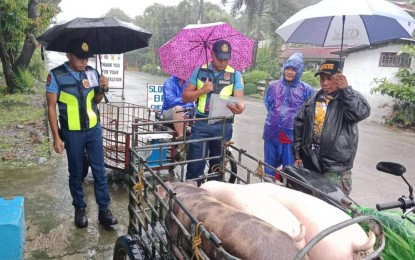
CHECKPOINT. Police officers check the documents of the swine being transported in Balaoan town, La Union in this undated photo. The Office of the Provincial Veterinarian of La Union on Friday (Oct. 11, 2024) said pork products in local markets are safe and supply is sufficient despite the presence of African swine fever in some localities. (Photo courtesy of Balaoan Police Station)
MALASIQUI, Pangasinan – The Office of the Provincial Veterinarian (OPVet) of La Union said pork products in local markets are safe and supply is sufficient amid the African swine fever (ASF) issues in some areas.
The OPVet said daily pork production in the province ranges from 956 to 1,085 slaughtered hogs, or an average of 40,468 kilos to 75,122 kilos.
Provincial Veterinarian Dr. Domingo Bobby Calub III, in a statement on Friday, said stringent measures are implemented to control the spread of ASF and protect the province’s swine industry.
The provincial government’s ongoing measures include culling, ASF testing, quarantine checkpoints, and farm biosecurity, with the strict enforcement being implemented with the local government units and the Philippine National Police.
He said financial and technical assistance have been extended to affected raisers, and called for stricter penalties for violators, proposing amendments to empower village officials in enforcing quarantine laws.
The OPVet, through the Sangguniang Panlalawigan, will also explore more measures, including ASF vaccine studies, enhanced monitoring, and stronger collaboration with national agencies, LGUs, and stakeholders, to bolster the resilience of La Union’s swine industry against ASF.
Fifty-three villages from eight localities in the province were categorized by the Department of Agriculture as red zones due to the presence of ASF.
These villages are in the towns of Balaoan, Luna, Bangar, Bacnotan, Santol, San Juan, Rosario, and San Fernando City.
Dr. Alfredo Banaag, DA 1 (Ilocos Region) regulatory division chief and ASF focal person, said about 2,460 hogs have been culled as of Oct. 3 to contain the further spread of the virus, while 344 hog raisers are affected.
In the past, the policy is to cull all pigs within the 1 km. radius of the area where the infected animal is located but this was revised last September, with the covered area cut to a radius of 500 meters.
Hogs that tested positive for the virus will be culled but those that turn out negative need to be immediately brought to the area’s slaughterhouse and sold to consumers.
Banaag said affected hog raisers would receive indemnification from the DA for their culled hogs, amounting to PHP4,000 per head for piglets, PHP8,000 per head for growers and fatteners, and PHP12,000 per head for breeders.
“They can claim the indemnification for a maximum of 20 heads per hog raiser,” he said. (PNA)
